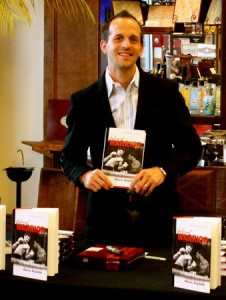Haddonfield Native’s Bio of Boxer Alexis Arguello Pulls No Punches
By Tim Zatzariny of the Haddonfield-Haddon Township Patch

Haddonfield native Christian Giudice is the author of a biography of boxing great Alexis Arguello.
Alexis Argeullo’s death inadvertently gave birth to Christian Giudice’s biography of the boxing great.
Arguello died of an apparent suicide on July 1, 2009. At the time, the 57-year-old retired fighter was mayor of Managua, the capital city of his native Nicaragua.
About a year earlier, Giudice had traveled to Nicaragua to interview Arguello and those who knew him, for a biography of the world champion in three different weight classes. But after Giudice returned to the United States, negotiations between Arguello and the author broke down, and the book stalled.
Then tragedy struck, and Arguello’s death put the boxer’s name back in the headlines again. Potomac Books agreed to publish Giudice’s biography of the fighter turned politician.
Beloved Warrior: The Rise and Fall of Alexis Arguello was released earlier this year. Giudice, a 1992 Haddonfield Memorial High School graduate, will sign copies of the book from 2 to 5 p.m. Friday, Dec. 28 at Jersey Java and Tea, and 10 a.m. to 1 p.m. Saturday, Dec. 29 at Nero’s Cigars, both in Haddonfield.
Giudice’s book is the first English-language biography of Arguello. Giudice’s previous book, Hands of Stone, originally published in 2007, examined the life of another Latin boxing great, Roberto Duran of Panama.
When he’s not writing about boxing, Giudice, 38, is a high-school English teacher. He lives in Charlotte, NC with his wife, Tair. The couple is expecting their first child in January.
‘He was just a classic boxer’
Guidice’s interest in boxing dates back to his childhood, when his father took him to fights in Atlantic City.
Guidice chose Arguello as the subject of his second biography because, “he was someone who intrigued me, for his class, the respect he showed people inside and outside the ring.”
Although he was known as a gentleman, Arguello could be unrelenting in the ring. “Arguello wold just break you down systematically,” Giudice said. “He was just a classic boxer. He was so precise. He knew if he wasn’t going to get you in the fifth round, he was going to get you in the 10th.”
Coming to boxing at the relatively late age of 16, it was Argeullo’s work ethic that carried him from poverty in Nicaragua to the top of the fight game, Giudice writes.
“Most boxers start fighting at age nine or ten and essentially spend their childhood near the bags; for Alexis, boxing came as a last recourse so his family wouldn’t starve. Unlike most fighters who lacked the intense discipline needed to stay afloat in the sport, Arguello immediately looked at the sport as his job.”
After winning world titles in three weight classes (one of his lightweight title defenses included a classic 1981 battle with Ray “Boom Boom” Mancini), Arguello moved up in weight again in 1982 to challenge junior-welterweight champion Aaron “The Hawk” Pryor.
In the 14th round of a brutal fight, Pryor knocked out Arguello. But, Pryor’s victory has always been tainted in they eyes of some boxing observers who believe Pryor’s trainer, Panama Lewis, used a water bottle between the 13th and 14th rounds to give Pryor an illegal substance that helped him win the fight.
Pryor and Arguello fought again in September 1983. This time, Pryor knocked Arguello out in the 10th round. Arguello fought sporadically again until 1986, when he retired. For years, he battled drug and alcohol problems. He made a brief comeback in 1994, and retired for good a year later following a loss to unknown fighter Scott Walker.
Arguello was inducted into the International Boxing Hall of Fame in 1992.
His involvement in Nicaraguan politics dated back to the 1980s, when he sided with the rebel Contras in the country’s long-running civil war. Arguello later joined forces with the Sandista party, who helped him get elected mayor of Managua in November 2008.
Arguello was frustrated at being a figurehead for the party, and when it became clear he was being stripped of any political power, Arguello became despondent and decided to leave politics, according to Giudice.
“I don’t think they killed, him but they knew what buttons to push, and they knew how fragile he was emotionally,” Giudice said of the Sandinistas. “I’m convinced they put him into a corner and he felt there was no other option than to kill himself. A lot of people believe he was assassinated.”
Despite Arguello’s sad end, he’ll be remembered most for his heart, Giudice said.
“He always knew what he represented to people. When you met him, you knew that he truly cared.”
Read the original article at the Haddonfield-Haddon Township Patch
